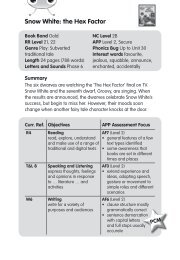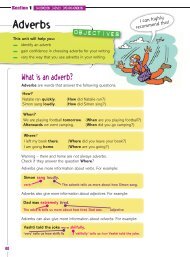Unit 1 Developing effective communication in health and social care
Unit 1 Developing effective communication in health and social care
Unit 1 Developing effective communication in health and social care
Create successful ePaper yourself
Turn your PDF publications into a flip-book with our unique Google optimized e-Paper software.
BTEC Level 3 National Health <strong>and</strong> Social Care<br />
AS11<br />
Assertive behaviour<br />
For each scenario below place the correct letter next to the response.<br />
A = Aggressive, S = Submissive, V = Assertive<br />
<strong>Unit</strong> 1 <strong>Develop<strong>in</strong>g</strong> <strong>effective</strong> <strong>communication</strong> <strong>in</strong><br />
<strong>health</strong> <strong>and</strong> <strong>social</strong> <strong>care</strong><br />
1. A colleague promises to call you with some important <strong>in</strong>formation concern<strong>in</strong>g a client. He doesn’t call.<br />
a. You feel hurt but don’t say anyth<strong>in</strong>g about it, th<strong>in</strong>k<strong>in</strong>g he’s probably really busy.<br />
b. R<strong>in</strong>g him up <strong>and</strong> say, ‘I don’t like it when you tell me you’ll do someth<strong>in</strong>g <strong>and</strong> you don’t. I wish you<br />
would call me when you say you will.’<br />
c. R<strong>in</strong>g him <strong>and</strong> say, ‘You are so unprofessional! You never do what you say you’ll do.’ Hang up<br />
before he can give any explanation.<br />
2. You want permission from your boss to change your work day so that you can attend your sister’s wedd<strong>in</strong>g.<br />
a. Just swap with a friend <strong>and</strong> say that you didn’t th<strong>in</strong>k he would m<strong>in</strong>d.<br />
b. Tell yourself ‘There’s no po<strong>in</strong>t even ask<strong>in</strong>g. I never get what I want.’<br />
c. Say, ‘There’s a family wedd<strong>in</strong>g com<strong>in</strong>g up that I would really like to attend. Can I change my<br />
work<strong>in</strong>g day next week?’<br />
3. Your client has just been diagnosed with a sexually transmitted <strong>in</strong>fection (STI) <strong>and</strong> asks you to f<strong>in</strong>d some<br />
<strong>in</strong>formation for her. You visit the library look<strong>in</strong>g for books on STIs, <strong>and</strong> you cannot f<strong>in</strong>d any.<br />
a. Say loudly, ‘This place is ridiculous! You can’t f<strong>in</strong>d anyth<strong>in</strong>g here!’<br />
b. Ask the librarian, ‘Could you show me where to f<strong>in</strong>d a book about STIs?’<br />
c. W<strong>and</strong>er around, not want<strong>in</strong>g to ask because you are afraid you will look stupid.<br />
4. You are just leav<strong>in</strong>g the office after an eight-hour shift when your boss enters <strong>and</strong> asks you to stay on for an<br />
extra hour or two as he needs to attend an emergency meet<strong>in</strong>g. You are due to catch the last tra<strong>in</strong> home.<br />
a. Say, ‘No way! I’ve done my shift. You’ve got no right to ask me to do more.’<br />
b. Say, ‘I am due to catch the last tra<strong>in</strong> home so I’m afraid I can’t help out. I’ll give you the number of<br />
my colleague who has agreed to be on call today.’<br />
c. Say, ‘Well, I have been here all day <strong>and</strong> I do have a tra<strong>in</strong> to catch but if you really want me to I<br />
suppose I can.’<br />
Practise your assertive behaviour.<br />
In pairs, role-play the scenarios below. Respond <strong>in</strong> an assertive manner. Be aware of your non-verbal behaviour<br />
as well as your verbal response.<br />
A. Your boss has given you a task to complete, but you are still busy on a task she set you earlier that day.<br />
B. You are out shopp<strong>in</strong>g with a client who uses a wheelchair. A small group of youths say some rude th<strong>in</strong>gs as<br />
you pass them.<br />
C. You are at your first team meet<strong>in</strong>g <strong>in</strong> a new job <strong>and</strong> a number of your colleagues are cont<strong>in</strong>ually us<strong>in</strong>g<br />
jargon that you do not underst<strong>and</strong>.<br />
D. You have been work<strong>in</strong>g <strong>in</strong> a residential home for six months but feel you are still not be<strong>in</strong>g given enough<br />
responsibility. You decide to discuss it with your team leader.<br />
© Pearson Education Ltd 2010. Copy<strong>in</strong>g permitted for purchas<strong>in</strong>g <strong>in</strong>stitution only. This material is not copyright free. 1

















